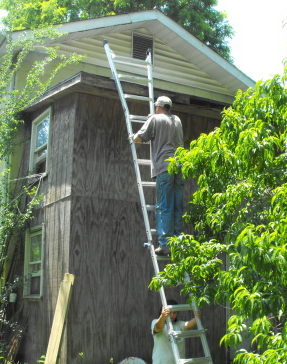
Two tips from traditional societies
 The World Until Yesterday
includes an entire chapter on constructive paranoia --- the tendency of
members of traditional societies to assume the worst can happen and to
avoid potentially hazardous situations. I was tickled by this
chapter because Mark applies the same strategy to our farm, although he
calls it "safety first." We have rules like "No one uses a ladder
when they're alone on the farm." The idea is that, even if I would
probably be fine 99 times out 100 when clambering up a ladder, the
100th time could kill me, especially if no one was around to rush me to
the hospital. Similarly, in traditional societies, camping under a
dead tree might be fine most of the time, but why risk it if a tree
fell on your great-uncle and killed him?
The World Until Yesterday
includes an entire chapter on constructive paranoia --- the tendency of
members of traditional societies to assume the worst can happen and to
avoid potentially hazardous situations. I was tickled by this
chapter because Mark applies the same strategy to our farm, although he
calls it "safety first." We have rules like "No one uses a ladder
when they're alone on the farm." The idea is that, even if I would
probably be fine 99 times out 100 when clambering up a ladder, the
100th time could kill me, especially if no one was around to rush me to
the hospital. Similarly, in traditional societies, camping under a
dead tree might be fine most of the time, but why risk it if a tree
fell on your great-uncle and killed him?
Another tip we can take
away from traditional societies is a different way of looking at trade
items. Diamond notes that members of traditional societies trade
for both useful and luxury items even if the communities could have
easily learned how to make the traded-for items on their own. Why
not be self-sufficient if you can be? Diamond's conclusion is that
trade is really about cementing bonds between the traders just as much
as it is about getting something you really need. In fact,
traditional societies often have a time lapse between gifts, so it's
more like you're building social capital by giving a gift than like
you're bartering. Those of us raised in a money-based society may
find this technique odd, but I feel like using social capital to build
relationships is just as valuable in modern societies as it was in
ancient ones.
| This post is part of our The World Until Yesterday lunchtime series.
Read all of the entries: |
Want more in-depth information? Browse through our books.
Or explore more posts by date or by subject.
About us: Anna Hess and Mark Hamilton spent over a decade living self-sufficiently in the mountains of Virginia before moving north to start over from scratch in the foothills of Ohio. They've experimented with permaculture, no-till gardening, trailersteading, home-based microbusinesses and much more, writing about their adventures in both blogs and books.
Want to be notified when new comments are posted on this page? Click on the RSS button after you add a comment to subscribe to the comment feed, or simply check the box beside "email replies to me" while writing your comment.
